- February 21, 2025
-
-
Loading

Loading
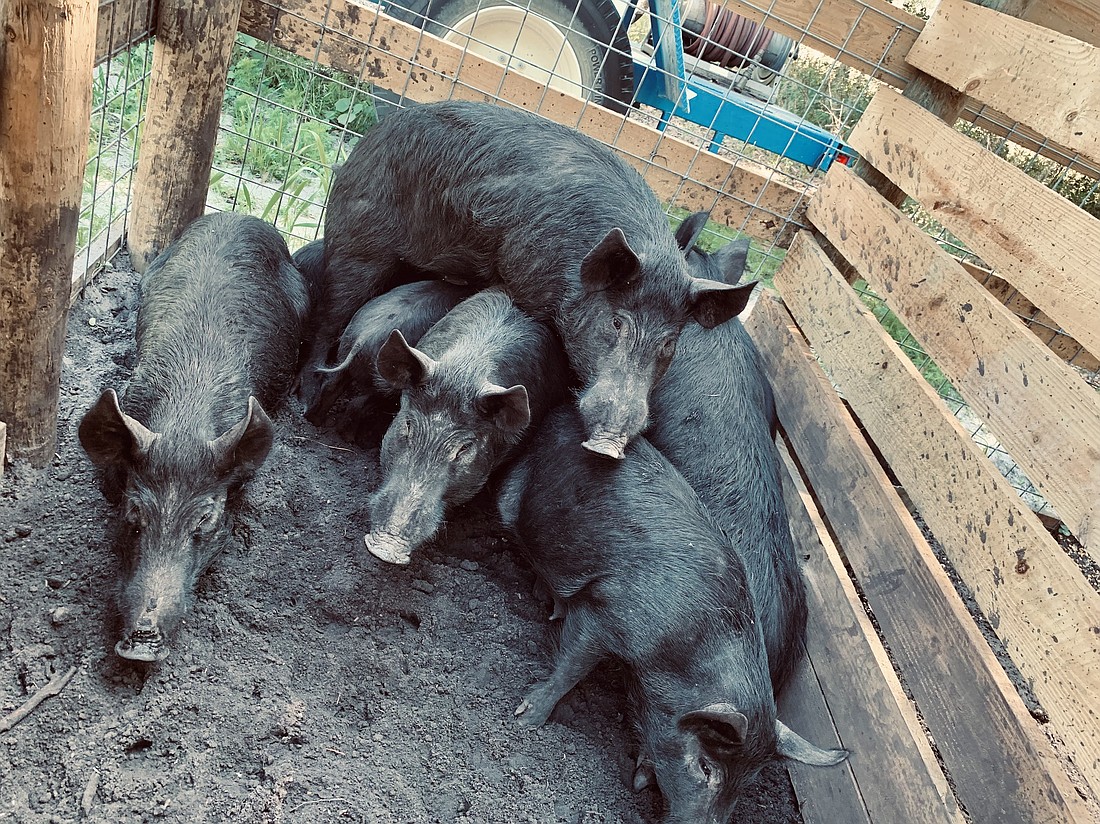
Running hog wild is all fun and games until it’s the hogs doing it.
In 2021, feral hogs were spotted so regularly in backyards and on the streets of Lakewood Ranch that Lakewood Ranch's Inter-District Authority hired a trapper. Last year, Manatee County set traps in Premier Park.
The efforts have continued in 2023 and the fiscal year 2024 recommended budget includes funds for hog trapping.
A feral hog capture program managed by Manatee County's Natural Resources department is attempting to get a handle on the year-round breeders in a way that can be beneficial for its citizens.
For example, hogs captured by the county have the potential of becoming bacon or part of a pork quesadilla at local restaurants.
Natural Resources just put in a budget request of $68,190 for 2024 to hire an additional ranger and to buy six more traps to expand the program, a small cost considering the findings from the USDA Animal Plant Health Inspection Service that feral hogs cause an estimated $2.5 billion in damage and control costs per year throughout the country.
Hogs cause property damage, destroy crops, displace native wildlife and carry parasites and diseases. APHIS estimates over six million are living across 35 states, predominately in the south.
Estimates offer a range of population in Florida, between 500,000 and over a million, but hogs breed so rapidly, it’s hard to pinpoint an exact number. What is known about wild hogs in Florida is that they are living and breeding in all 67 counties.
Manatee County has been running its pilot program for the past two years out of Duette Preserve. When a complaint is received, a feeder filled with corn is delivered as close as possible to that area on county land. Once the hogs get comfortable, a corral pen is built around the feeder to trap them.
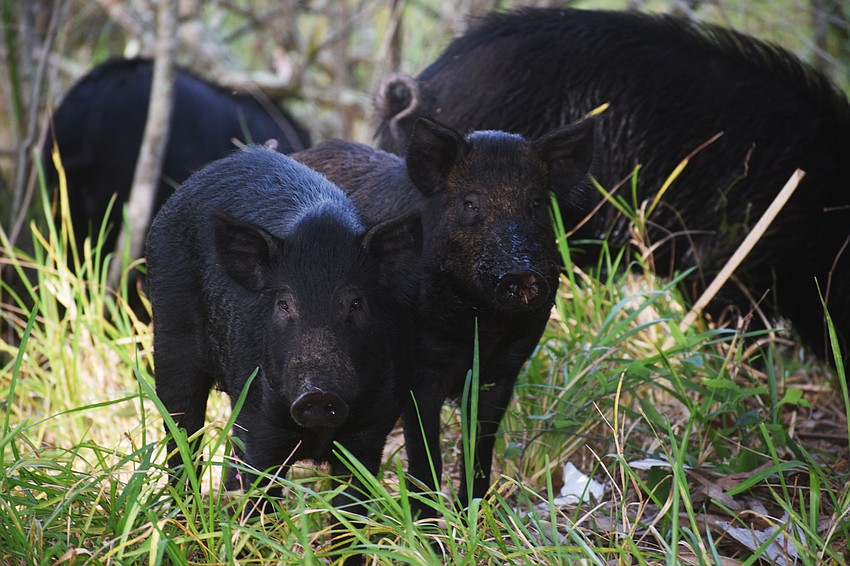
“Our services are limited to our own county-held parks and preserves,” Natural Resources Director Charlie Hunsicker said. “We cannot provide taxpayer supported services to private property.”
Currently, the county has three traps that consist of a feeder, camera and corral. The camera sends notifications and photos to Park Ranger Jerry Miller’s cell phone. Being that hogs are mostly nocturnal, he sometimes receives 4 a.m. wakeup calls.
“The hogs are almost like a volunteer thing. I don’t comp out time or anything, but it is weird hours,” Miller said. “I’ll be in the movies or out to dinner and they'll go into the pen.”
No matter where he is, as long as Miller has service on his cell phone, he can shut the gate. He’s careful though, watching the video for up to a half hour before pulling the trigger. Miller said hogs are smart, so he has to get the whole sounder (herd) at once because the stragglers won’t return to that feeder after the rest have been captured.
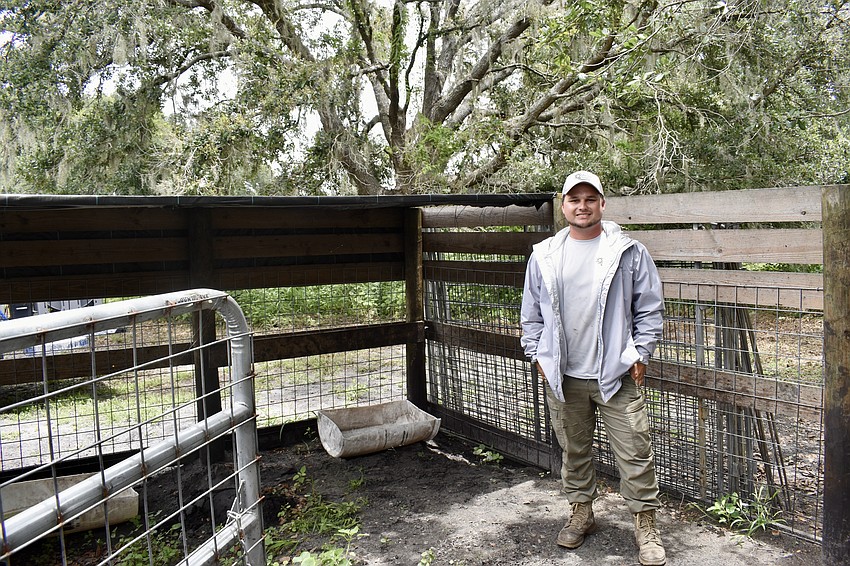
It’s a job that requires patience from start to finish. Once the feeder and camera are installed, Miller monitors the area for up to two weeks counting hogs. After the hogs are comfortable with the feeder and Miller is comfortable with his count, his team moves in with a pen. The hogs will quickly adjust to walking in and out of the pen for more corn.
Once they are trapped, the hogs are transported to a holding pen near the entrance of Duette Preserve, where they're kept under shade and given food and water.
From there, Shogun Farms takes over. Swamp Mountain Outfitters, the trapping side of the business, transports the hogs to Shogun Farms in Hillsborough County. The hogs are quarantined and fed organic, domestic feed for about five months in preparation for slaughter. After being processed and inspected by the USDA, the meat is sold.
The county collects a small fee from Shogun per hog. Gross program revenues for Manatee County in 2022 were $290, which covered the cost of corn to bait them.
Currently, the county is only capturing between 100 and 150 hogs per year, and not all are from traps.
“Roughly 50% are trapped, and 50% are harvested by the public using archery and firearms during our regulated hunts that occur from September through April,” Natural Resources Division Manager Michael Elswick said.
At Duette, the big game hunt also includes whitetail deer, but small incentives are offered to encourage hunters to target hogs.
“It’s another way to generate interest,” Miller said. “They have to bring the hogs out, and they’ll eat them, too.”
One rule of the hunt, made clear in the guidelines, is that the “waste of wildlife is prohibited.” Nothing can be left behind in the preserve. The harvested hog becomes the hunter's responsibility.
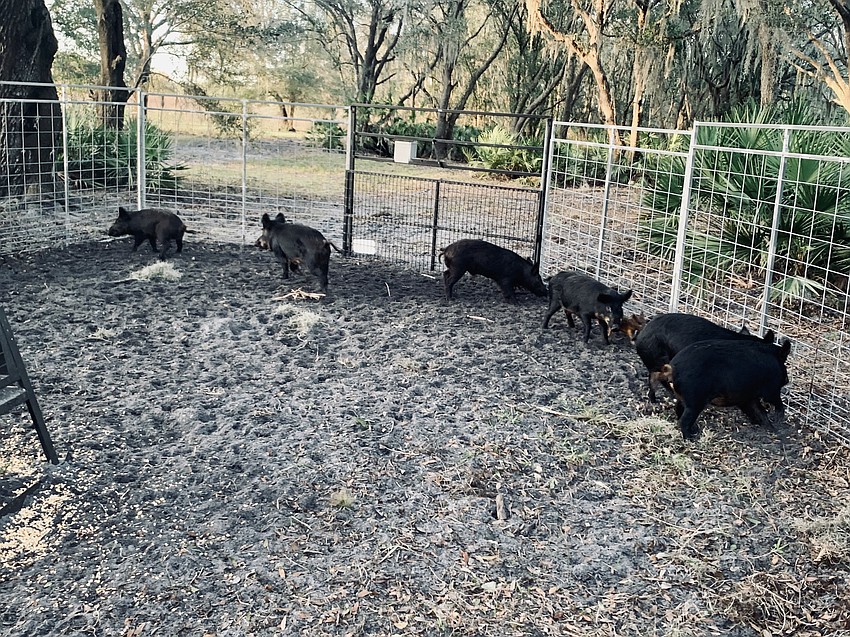
Within a 22,000-acre preserve like Duette, invasive hogs disrupt the natural environment. Beyond visible signs of “rooting” around the park, which looks like the start of trenches being dug, Miller said they eat the quail eggs, turkey eggs and snakes.
Rooting also spreads invasive grasses and plants throughout the preserve through either the hog eating the plants and expelling the seeds or picking up and transplanting seeds because they get caught in the hogs’ bristles.
Wild hogs are especially troublesome for local farmers. Miller worked for Lipman Family Farms in Duette before he was hired by the county six years ago. He handled animal intrusion and food safety.
“Even if the hogs didn’t eat the crops, which they obviously were doing, just their presence in the field, we would have to rope off an entire block,” Miller said. “You can’t take that risk with selling food to the market.”
According to the Animal and Plant Health Inspection Service of the U.S. Department of Agriculture, risks include, “at least 30 viral and bacterial diseases and nearly 40 parasites that can be transmitted to humans, pets, livestock and other wildlife.” The most well known examples are E. Coli, salmonella, hepatitis and swine influenza.
However, when properly monitored and prepared, not only are wild hogs safe to eat, but Sandbar owner Ed Chiles said, "This is arguably the finest pork in North America, and it has a tremendous story.”
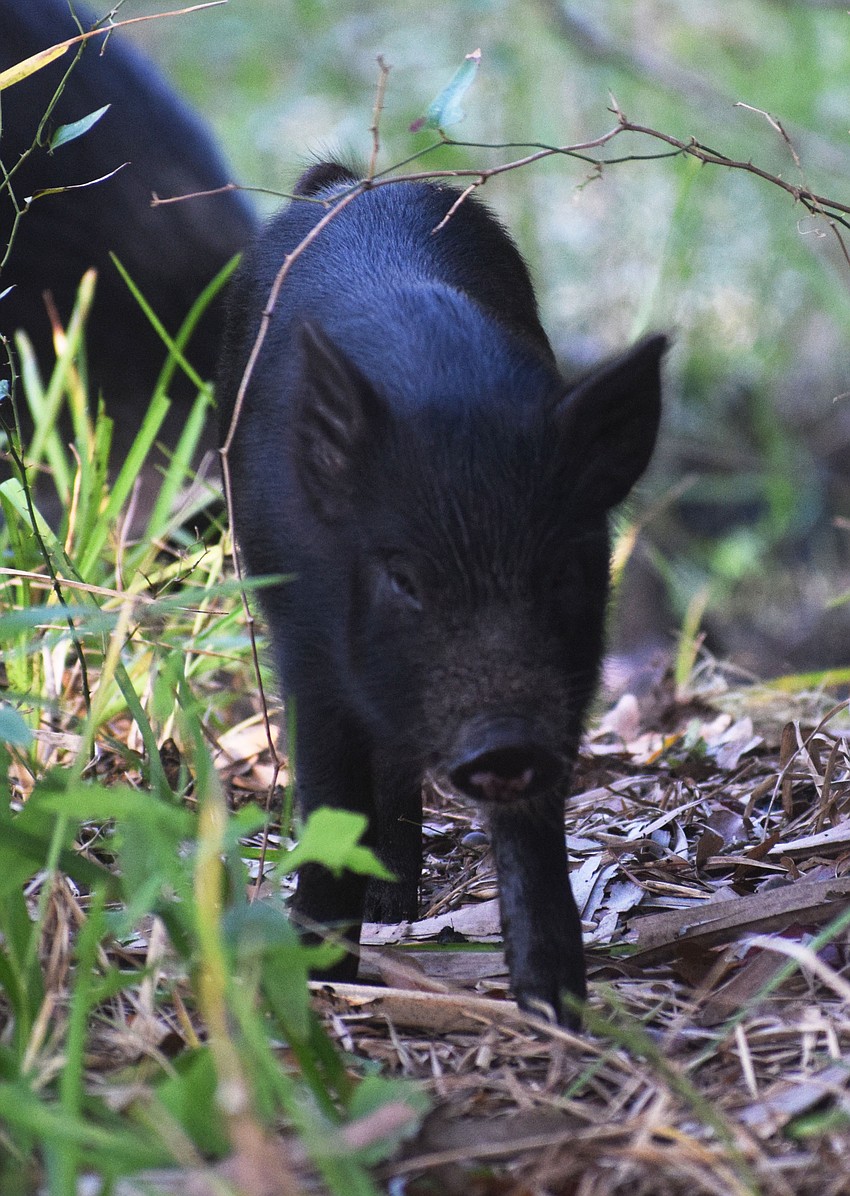
Chiles said it is the finest ham in the world because the lineage of Florida wild hogs dates back to the 1500s when Queen Isabella of Spain sent hogs with Hernando Desoto on his historic expedition.
Chiles compares the meat to Iberico ham from Spain, which can cost up to $4,500 for a leg. The meat is sought-after because of the pig’s acorn diet.
At Shogun Farms, the hogs are fed acorns, denatured grains, vegetables and dairy products to round out their fat content.
“When I eat it, I want a little bit of fat with every bite because of the taste. The flavor is just so exceptional, ” Chiles said. “The pig you want to eat is the pig that lived a good life.”
Chiles’ chefs take the product to the next level. One of his chefs makes a mouthwatering pulled pork from his grandmother’s recipe.
Chiles Hospitality owns three restaurants and a bakery on Anna Maria Island, plus Gamble Creek Farms in Parrish. The company uses every part of the hog. The pork belly is used in the collard greens, and the bones are turned into fertilizer for the farm.
Bacon, sausage and cured ham are available for purchase at Gamble Creek’s farm market.
“This isn’t taking lemons and making lemonade. This is taking lemons and making limoncello,” Chiles said. “It’s as far as you can go with an invasive species that is causing millions of dollars of damages and turning it into an artisanal product that is healthy and good for you and is a great way to deal with a problem in a sustainable way.”